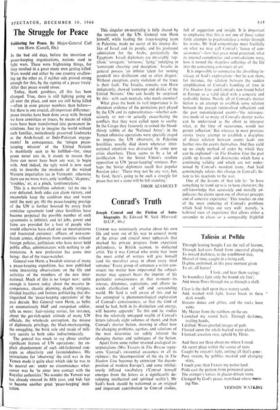The Struggle for Peace
Soldiering for Peace. By Major-General Carl von Horn. (Cassell, 50s.) IN the bad old days, before the invention of peace-keeping organisations, nations used to fight wars. These were frightening things, for they resulted in a great many men getting killed. Wars would end either by one country swallow- ing up the other or, if neither side proved strong enough for this, by the signing of a peace treaty. After that peace would ensue.
Today, thank goodness, all this has been changed. True, there is still fighting going on all over the place, and men are still being killed —often in even greater numbers than before— but there is one crucial, all-important difference: peace treaties have been done away with. Instead we have armistices or truces, by means of which wars have been transformed into permanent in- stitutions. Just try to imagine the world without such familiar, meticulously preserved landmarks as the Arab-Israeli or Indo-Pakistani engage- ments! In consequence, the 'unique peace- keeping mission' of the United Nations is manifestly seen to be fulfilled—for, since peace never sets in, it stands to reason that there can never have been any war, to begin with. And indeed, the ugly word is now used only to describe the misdeeds of the wicked Western imperialists (as in Vietnam): otherwise there are no more wars, only `conflicts,' disputes,' `troubles,' or, at a pinch, 'confrontations.'
This is a marvellous solution: (a) no one is ever defeated, both sides can claim victory, and meanwhile keep the cauldron nice and warm until the next go; (b) the peace-keeping prestige of the UN is further boosted by every fresh armistice agreement (and since hostilities have become perpetual the possible number of such agreements is infinite); and (c) jobs, power and fame are provided for a host of people who would otherwise have eked out an inconspicuous and frustrated existence: officers of non-com- batant armies, diplomats from countries without foreign policies, politicians who have never held public office, administrators with nothing to ad- ministrate. A new profession has come into being: that of the truce-watcher.
General von Horn, a Swedish veteran of many a peace-keeping expedition, has now published some interesting observations on the life and activities of the members of the new inter- national. Much of this is no longer new: quite enough is known today about the massive in- competence, chaotic planning, deadly intrigues, divided loyalties and furious politicking that dis- tinguished the 'peace-keeping operations' of the past decade. But General vorn Horn, as befits an ostentatiously bluff and outspoken soldier, tells us more: hair-raising stories, for instance, about the get-rich-quick attitude of many UN officials, the wholesale corruption, the misuse of diplomatic privilege, the black-marketeering, the smuggling, the brisk sale and resale of mili- tary secrets to both sides indiscriminately.
The general has much to say about another significant feature of UN operations: the ex- plicit abandonment of such old-fashioned con- cepts as objectivity and fairmindedness. His instructions for 'observing' the civil war in the Yemen made it quite clear which side he was to be neutral on: under no circumstances what- soever was he 'to enter into contact with the Royalist authorities.' No wonder the Yemeni war has already entered its fifth year, and bids fair to become another great 'peace-keeping' insti- tution.
This singular un-neutrality is fully shared by the servants of the UN. General von Horn himself, while leading the truce-keeping team in Palestine, made no secret of his intense dis- like of Israel and its people, and his profound admiration for the Arabs, particularly the Egyptians. Israeli diplomats are invariably 'rep- tilian,' arrogant,"tortuous,"lying,' indulging in `consistent cheating and deception.' Israelis in general possess 'an infinite talent for turning goodwill into disillusion and so often disgust.' Without exception, every violation of the truce is their fault. The Israelis, remarks von Horn indignantly, showed 'contempt and dislike of the United Nations.' One can hardly be surprised by this: with such neutrals, who needs enemies?
What gives the book its real importance is its abundant evidence of the pernicious part played by the UN and its representatives—whether con- sciously or not—in actually exacerbating the conflicts that they were called upon to soothe. In the Congo they fatuously re-armed the blood- thirsty rabble of the 'National Army'; in the Yemen offensive operations were specially staged to impress the UN observers; in Palestine hostilities usually died down whenever inter- national attention was distracted by some new crisis elsewhere. There seems to be a lot of justification for the Soviet Union's resolute opposition to UN 'peace-keeping' ventures. Per- haps the Soviet diplomats recall that popular Russian joke: 'There may not be any war, but, by God, there's going to be such a struggle for peace that not a stone will be left standing.'
TIBOR SZAMUELY






































 Previous page
Previous page